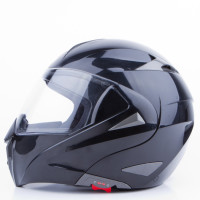NHTSA Proposing Change in Rule Regarding Regulation of “Novelty” Helmets

The National Highway Traffic Safety Administration (“NHTSA”) has proposed a change to existing helmet rules, intended to mandate safer helmet use in states with helmet laws. The changed rule, presently available for public comment, would change the NHTSA’s definition of “motorcycle helmet” to encompass novelty helmets, due to the fact that, while they are not intended or advised for on-road use, they are marketed to consumers for on-road use. With the rule change would come a requirement that all Department of Transportation-compliant helmets meet certain preliminary screening criteria that police officers could easily identify and test while on the road, making it easier for officers to cite non-compliant helmets. For instance, the helmets would need to cover certain parts of the wearer’s skull and meet certain thickness requirements that police could test with a probe.
The NHTSA asserts that head injuries are the type of injury most likely to cause death among motorcycle riders, and that the use of novelty helmets is one of the contributing factors to the continued prevalence of head injuries among motorcycle riders. The NHTSA estimates that some 27% of riders on roads and highways wear novelty helmets, despite the fact that such helmets are not recommended for highway use.
Many motorcyclists have voiced objections to the new rules, arguing that the arbitrary measures of skull coverage and thickness as determining the safety of the helmet would not take into account advances in helmet technology, and would in fact cause much safer helmets made with more advanced materials to be deemed illegal. Motorcycle advocate groups have also voiced concerns that police won’t know which helmets have been exempted from the screening criteria, and will force law-abiding motorcyclists to go to court to prove the exemption on a regular basis.
Helmets Save Lives for Bikers Struck by Negligent Motorists
Motorcyclists are already vulnerable on the road, and become much more so when they fail to wear helmets. Even the safest, most experienced motorcycle rider knows that, no matter how careful or rule-abiding they may be, other drivers’ negligence is a serious threat, and for that reason, smart bikers wear appropriate safety gear. While fatalities for passenger vehicle drivers have declined sharply in recent years, motorcyclist fatalities doubled in the period between 1994 and 2012. Alabama was one of the first states to adopt a universal motorcycle helmet law in 1967. The Centers for Disease Control estimate that, in 2010, 39 lives were saved per every 100,000 registered motorcycles, and the state of Alabama saved $80 million in economic costs from helmet use.
If your or a fellow rider have been injured in an Alabama motorcycle accident, contact a skilled attorney who understands the hazards that motorcycle riders face. Contact the experienced Mobile motorcycle accident attorney J. Allan Brown for a free consultation on your possible motorcycle accident lawsuit at 251-473-6691.




